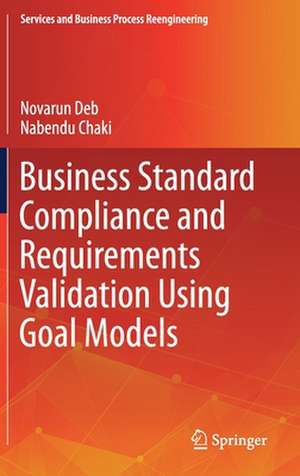Business Standard Compliance and Requirements Validation Using Goal Models: Services and Business Process Reengineering
Autor Novarun Deb, Nabendu Chakien Limba Engleză Hardback – 27 feb 2020
| Toate formatele și edițiile | Preț | Express |
|---|---|---|
| Paperback (1) | 634.68 lei 6-8 săpt. | |
| Springer Nature Singapore – 27 feb 2021 | 634.68 lei 6-8 săpt. | |
| Hardback (1) | 640.88 lei 6-8 săpt. | |
| Springer Nature Singapore – 27 feb 2020 | 640.88 lei 6-8 săpt. |
Preț: 640.88 lei
Preț vechi: 753.97 lei
-15% Nou
Puncte Express: 961
Preț estimativ în valută:
122.65€ • 133.18$ • 103.02£
122.65€ • 133.18$ • 103.02£
Carte tipărită la comandă
Livrare economică 22 aprilie-06 mai
Preluare comenzi: 021 569.72.76
Specificații
ISBN-13: 9789811525001
ISBN-10: 9811525005
Pagini: 152
Ilustrații: XXV, 152 p. 78 illus., 39 illus. in color.
Dimensiuni: 155 x 235 mm
Greutate: 0.43 kg
Ediția:1st ed. 2020
Editura: Springer Nature Singapore
Colecția Springer
Seria Services and Business Process Reengineering
Locul publicării:Singapore, Singapore
ISBN-10: 9811525005
Pagini: 152
Ilustrații: XXV, 152 p. 78 illus., 39 illus. in color.
Dimensiuni: 155 x 235 mm
Greutate: 0.43 kg
Ediția:1st ed. 2020
Editura: Springer Nature Singapore
Colecția Springer
Seria Services and Business Process Reengineering
Locul publicării:Singapore, Singapore
Cuprins
Introduction.- State-of-the-Art.- i∗ and Enterprise Hierarchies.- Model Checking with i∗.- Goal Model Maintenance.- Conclusion and Future Work.
Notă biografică
Novarun Deb is a Research Associate at the Department of Environmental Sciences, Informatics, and Statistics, Ca' Foscari University, Italy. He received his Master’s and Ph.D. in Computer Science & Engineering from the University of Calcutta, India. His current research interests include computer networking, software engineering, requirements engineering, model-based development, wireless ad hoc networks, wireless mesh networks, and system modelling. He has published many papers in these areas in international journals and conference proceedings. He has a few book chapters and a patent on data structures as well.
Nabendu Chaki is a senior member of the IEEE and a Professor at the Department of Computer Science & Engineering, University of Calcutta, India. Besides editing several volumes in LNCS, Springer, and other series, Dr. Chaki has authored several books with respected publishers like Taylor and Francis (CRC Press), Pearson Education, Springer, etc. Having also publishedmore than 100 refereed research papers in journals and international conference proceedings, his areas of interest include software engineering, distributed systems, and network security. Dr. Chaki has also served as a Research Assistant Professor at the US Naval Postgraduate School, Monterey, CA. He is a visiting faculty member for many universities including Ca’Foscari University, Venice, Italy. Dr. Chaki has contributed to the IEEE Computer Society’s SWEBOK v3 as a Knowledge Area Editor for Mathematical Foundations. He currently serves as an editorial board member for many international journals, and has been the founding Chapter Chair of the ACM Professional Chapter in Calcutta, India, since January 2014.
Nabendu Chaki is a senior member of the IEEE and a Professor at the Department of Computer Science & Engineering, University of Calcutta, India. Besides editing several volumes in LNCS, Springer, and other series, Dr. Chaki has authored several books with respected publishers like Taylor and Francis (CRC Press), Pearson Education, Springer, etc. Having also publishedmore than 100 refereed research papers in journals and international conference proceedings, his areas of interest include software engineering, distributed systems, and network security. Dr. Chaki has also served as a Research Assistant Professor at the US Naval Postgraduate School, Monterey, CA. He is a visiting faculty member for many universities including Ca’Foscari University, Venice, Italy. Dr. Chaki has contributed to the IEEE Computer Society’s SWEBOK v3 as a Knowledge Area Editor for Mathematical Foundations. He currently serves as an editorial board member for many international journals, and has been the founding Chapter Chair of the ACM Professional Chapter in Calcutta, India, since January 2014.
Textul de pe ultima copertă
This book discusses enterprise hierarchies, which view a target system with varying degrees of abstraction. These requirement refinement hierarchies can be represented by goal models. It is important to verify that such hierarchies capture the same set of rationales and intentions and are in mutual agreement with the requirements of the system being designed. The book also explores how hierarchies manifest themselves in the real world by undertaking a data mining exercise and observing the interactions within an enterprise. The inherent sequence-agnostic property of goal models prevents requirement analysts from performing compliance checks in this phase as compliance rules are generally embedded with temporal information. The studies discussed here seek to extract finite state models corresponding to goal models with the help of model transformation. The i*ToNuSMV tool implements one such algorithm to perform model checking on i* models. In turn, the AFSR frameworkprovides a new goal model nomenclature that associates semantics with individual goals. It also provides a reconciliation machinery that detects entailment or consistency conflicts within goal models and suggests corrective measures to resolve such conflicts. The authors also discuss how the goal maintenance problem can be mapped to the state-space search problem, and how A* search can be used to identify an optimal goal model configuration that is free from all conflicts. In conclusion, the authors discuss how the proposed research frameworks can be extended and applied in new research directions. The GRL2APK framework presents an initiative to develop mobile applications from goal models using reusable code component repositories.
Caracteristici
Explains modeling enterprise hierarchies, model checking, and the semantic analysis of goal models Discusses case studies to create a real-world connection Includes mathematical derivations, comprehensive datasets, and performance graphs






